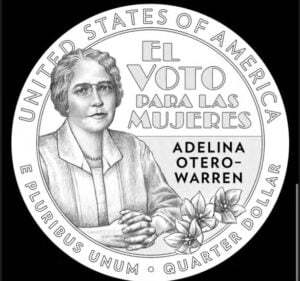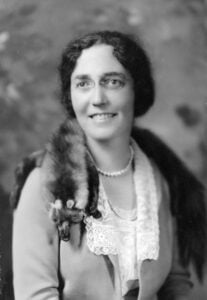

Nancy Kenney, niece of Adelina “Nina” Otero Warren, New Mexico’s pioneer suffragette, writes about her aunt’s achievements, firsts and family in honor of the impending release of the American Women Quarters, featuring Otero Warren’s image. The quarters are available NOW. CLICK HERE TO LEARN MORE.
By Nancy Kenney
My aunt, Adelina “Nina” Otero Warren, was a role model for women in her time. Born in 1881 in Las Lunas, she was a descendant of prominent Spanish families who arrived in North America in the 16th Century. Nina’s achievements as an advocate for political and social causes spanned through the 19th and 20th centuries; while New Mexico was an American territory and after NM gained statehood in (1912, and for 53 years beyond). She had Spanish and Native American blood, and brokered relationships in a contentious time. Her accomplishments, which broke many glass-ceilings, were the result of her dauntless courage to stand up for the people and cultures she loved.
The term “advocate” aptly describes Nina’s character. Her greatest strengths were her ability to convince predominantly male power brokers to support changes in favor of New Mexican women, advocate for passage of the 19 Amendment (woman’s right to vote), and advocate for children by challenging the Native American Boarding School standards imposed by the U.S.. She fought for English and Spanish literacy standards in the statewide curriculum, insisting that her Spanish culture not be replaced by ‘newcomers.’
Nina Otero Warren’s achievements as an advocate include:
- As a lead suffragette, Nina fought for New Mexico women’s right to vote with the passage of the 19th Amendment.
- Became the first Hispanic woman to run for the U.S. Congress, winning the Republican primary by a landslide. In the general election she was defeated because of rumors she was divorced, or so it is said.
- Advocated for the integration of military officers and servicemen, who at the time of her marriage to Officer Ransom Warren, were not allowed to socialize on base.
- Advocated for intercultural education as the first state woman Superintendent of Instruction at the tender age of 37. She insisted the curriculum be taught in Spanish and English and that teachers learn both Spanish culture and language.
- Advocated for cultural sensitivity during her tenure as the Supervisor of Indian Boarding Schools. Working against the norms of the time she insisted that native children should be allowed to speak their own language and retain their native culture so they could be integral parts of their communities when they returned. But the implementation of her policies was resisted. She went to Washington D.C. to lobby for better living conditions, burning filthy school mattresses and replacing them with individual student cots. Nina was shortly thereafter ‘released’ from her position.
- Advocated for The Homesteading Act, which was passed in 1863 so that individuals of modest means, or women, could build, farm, and live on their own tracts of land. Nina and Mamie Meadors homesteaded their own property “Las Dos” in 1935, 22 miles northwest of Santa Fe.
She was the oldest daughter of 12 Luna-Otero-Bergere children and pushed for her siblings to be educated and active in community affairs. When her mother, Eloisa Luna Bergere, lost her community law status after the territory became a state, Nina helped her set up a family trust that protected the rights of the single and widowed women in her family to retain their home and land, fighting against state laws that allowed only men to own property.
Nina became the head of the Folklorica Society incorporating artistic activities from the Spanish and Native cultures into events and economic generators for artisanos, dancers and authors. Her own book entitled, “Spain in Our Southwest” was published in 1936.
Nina demonstrated courage, intelligence, self-confidence, and an exceptional ability to influence in order to be an advocate for the just causes for women, children, and native communities.
Nina is loved deeply by her great nieces and nephews and when we gather at her Las Dos homestead, her presence is felt around the old sheepherder’s fireplace. She was a true tri-cultural educator, politician and suffragist ahead of her time and will always be remembered fondly and gratefully by her family.
